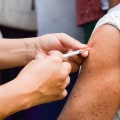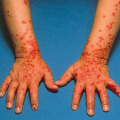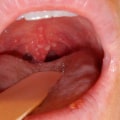With the increasing prevalence of virus infections, the need for accurate and timely detection has become more important than ever. Blood tests are increasingly seen as a reliable and cost-effective way to detect the presence of viruses in the human body. In this article, we will take an in-depth look at blood tests for the detection of viruses, including their accuracy, how they work, and how they are used to diagnose genital herpes. We will also discuss the potential risks associated with this type of testing and provide recommendations for best practices. A blood test is a type of laboratory test that is used to detect the presence of certain substances or antibodies in a person's blood.
In the case of genital herpes, it is used to detect the presence of the herpes simplex virus (HSV). This article will provide an overview of what a blood test is, how it works, its accuracy, and its importance in diagnosing genital herpes. A blood test involves taking a sample of blood from the patient and analyzing it in a laboratory. The laboratory will look for antibodies that are specific to HSV-1 and HSV-2, which are the two types of herpes viruses. If these antibodies are present, then it indicates that the patient has been infected with the herpes virus.
Blood tests can also be used to determine if the infection is active or dormant. Blood tests are generally very accurate and can detect even low levels of HSV in the blood. The accuracy of the test depends on the type of test used and the laboratory performing the test. Generally, a blood test will produce results within 24-48 hours. A blood test should be used when a person has symptoms of genital herpes. If a person has been exposed to someone with genital herpes, they should also have a blood test to determine if they have been infected.
Additionally, pregnant women may be tested for genital herpes to ensure they do not pass it on to their baby during childbirth. There are few risks associated with a blood test, though it may cause mild discomfort or pain at the site where the needle was inserted. Additionally, some people may experience dizziness or lightheadedness after having their blood drawn. A blood test for genital herpes can provide important information about a person's health and help them make informed decisions about treatment. It can help confirm a diagnosis of genital herpes and can differentiate between active and dormant infections. Additionally, it can be used to monitor the course of an infection and to help determine if treatment is working. In preparation for a blood test, it is important to tell your doctor about any medications you are currently taking, as some medications may interfere with the accuracy of the results.
It is also important to fast for 8-12 hours prior to having your blood drawn. After a blood test, results will generally be available within 24-48 hours. Your doctor will discuss the results with you and will be able to recommend appropriate treatment options if needed.
What are the Risks Associated with a Blood Test?
Having a blood test to detect the virus is generally considered to be a safe procedure. However, there are some risks associated with any medical procedure. This includes the risk of infection from the needle or other medical instruments, or a reaction to the anesthesia used during the procedure.In rare cases, there may be an adverse reaction to the blood test itself, such as an allergic reaction or an infection. In addition, there is always a risk of inaccurate results. Even if a blood test is done correctly and accurately, it may not detect the virus if it is present in very low levels in the body. This can lead to a false negative result. It is also important to note that the accuracy of a blood test can depend on the type of test used and the laboratory where the test is done. It is important to make sure that the laboratory used is accredited and that the test being used has been validated for accuracy.
What Happens After a Blood Test?
After having a blood test to detect the virus, the next step is for the results to be processed.The results are typically available within a few days, and they will be interpreted by a medical professional. Depending on the test, results may include a positive or negative diagnosis, as well as additional information about the virus. Positive results may also include information about the strain of the virus, while negative results may have additional comments regarding possible false results or inconclusive results. Once the results are available, it is important to discuss them with your doctor. Your doctor will help to interpret the results and explain any next steps that may be necessary based on your individual situation.
This could include more testing, follow-up appointments, or treatment. It is important to follow all instructions given by your doctor to ensure the best outcome for your health.
What is a Blood Test?
A blood test is a medical procedure used to detect the presence of specific antibodies in a person’s blood. These antibodies are produced by the body in response to an infection, such as herpes. During the test, a sample of blood is taken from the patient and tested for the presence of these antibodies.The results of the test can be used to diagnose or confirm an infection with the herpes virus. The procedure for a blood test is fairly straightforward. First, a health care provider will draw a sample of blood from the patient. The sample is then sent to a laboratory for testing. In some cases, the laboratory technician may be able to determine the results of the test immediately.
In other cases, it may take several days or longer for the results to be available. The accuracy of a blood test depends on several factors, including how long after infection the test was done and how many antibodies are present in the sample. In general, if the test was done more than six weeks after infection, it is considered very reliable. Additionally, if the antibody levels are high, then the test is considered very accurate.
What Does a Blood Test Test For?
A blood test is used to detect the presence of the herpes virus, which is responsible for causing genital herpes.The test looks for antibodies produced by the body in response to the virus, which can be identified through a blood sample. The accuracy of this test depends on the type and sensitivity of the test used, as well as the stage of infection. The most common type of blood test used to diagnose genital herpes is an enzyme-linked immunosorbent assay (ELISA) test. This test can detect IgG antibodies, which are produced by the body in response to the herpes virus.
It is most accurate when performed during the acute phase of infection, which is usually within the first few weeks of infection. It is also used to confirm a diagnosis in people who have developed symptoms of herpes. Another type of blood test that can be used to diagnose genital herpes is a Western blot test. This test detects IgM antibodies, which are produced early in the course of infection.
It is more accurate than an ELISA test but is usually only used when IgG antibodies cannot be detected. In general, blood tests for herpes are very accurate and can detect the presence of the virus with a high degree of confidence. However, it is important to note that a positive result does not necessarily mean that a person has an active infection and will experience symptoms. A negative result also does not mean that a person does not have the virus; it only indicates that antibodies are not present in their body.
Blood tests are an important part of diagnosing genital herpes and can provide valuable information about a person’s infection status. It is important to remember that a positive result does not necessarily indicate an active infection and should be confirmed with other tests, such as a swab test or culture.
What are the Benefits of a Blood Test for Genital Herpes Diagnosis?
A blood test is an important tool in diagnosing genital herpes. It can help detect the presence of the virus, allowing for an accurate diagnosis and appropriate treatment.Some of the benefits of having a blood test for genital herpes diagnosis include:Accuracy: Blood tests are accurate and reliable in detecting the presence of HSV-2, the virus that causes genital herpes. This helps to ensure that individuals receive an accurate diagnosis and appropriate treatment.
Non-invasive:
A blood test is non-invasive and does not require any special preparation. This makes it a more comfortable option than other methods of testing for genital herpes, such as swabbing or a physical exam.Cost-Effective:
Blood tests are relatively inexpensive and can be done quickly. This makes them an affordable option for diagnosing genital herpes.Convenience:
Blood tests can be done at home or at a doctor's office.This makes them convenient and easy to access.
Timely:
Blood tests provide results in a timely manner, allowing individuals to get an accurate diagnosis and begin treatment quickly.How Do I Prepare for a Blood Test?
A blood test is an important step in the diagnosis of genital herpes and it is important to take the right steps to prepare for it. Here are some tips to help you get ready:Before the Test:- Make sure to inform your healthcare provider of any medications, vitamins, or supplements that you are taking, as they can affect the accuracy of the test. - Let your doctor know if you are pregnant or have any allergies.During the Test:
- It is recommended that you fast for 8-10 hours before the test, as this will ensure that the results are accurate.- Drink plenty of water before and after the test to prevent dehydration.After the Test:
- It is important to follow your doctor’s instructions for aftercare, such as drinking plenty of fluids or eating a light snack.- Avoid strenuous activities or activities that could cause excessive sweating for at least 24 hours after the test. By following these tips, you can ensure that your blood test results are accurate and that you are properly prepared for the procedure.
When Should a Blood Test be Used for Genital Herpes Diagnosis?
A blood test is an important diagnostic tool for detecting the presence of genital herpes. It is typically used to confirm the presence of the virus when someone has experienced symptoms that suggest an infection. It can also be used to detect the presence of the virus in someone who has not yet experienced any symptoms. Blood tests for genital herpes are usually done in conjunction with other tests, such as swab tests and physical examinations. The accuracy of a blood test for detecting genital herpes depends on the type of test used.Different tests vary in their ability to detect the virus, so it is important to talk to a doctor and find out which type of test is most appropriate for the situation. Generally speaking, blood tests are more accurate when performed in combination with other tests. In general, a blood test should be used when there is a suspected infection and when other tests cannot provide conclusive results. It can also be used to determine if someone has had a recent infection, or if they have been exposed to the virus in the past. Blood tests can also help monitor the progression of an infection and track any changes in the virus over time. In some cases, a blood test may be used instead of other tests because it can provide quicker results.
However, it is important to note that blood tests do not always provide conclusive results and should not be used as a stand-alone diagnostic tool. This article has provided an overview of blood tests and their importance in diagnosing genital herpes. Blood tests are effective in detecting the presence of the herpes virus, and it is important for people who may be at risk of infection to have one. A blood test is safe, easy to perform, and highly accurate.
Preparing for a blood test is simple, and the results can be used to help guide treatment options. In conclusion, a blood test is an important part of diagnosing genital herpes.


